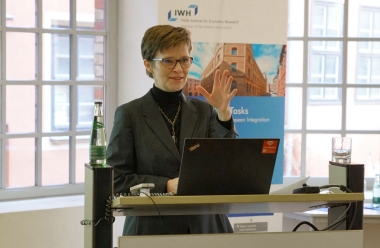|
|

|
|
|
|
|
Das Corona-Dilemma
Reint E. Gropp Die Politik steht zurzeit vor einem scheinbar unlösbaren Dilemma. Die Infektionszahlen sollen niedrig gehalten werden, solange es keine wirksame Therapie gegen Covid-19 gibt. Aber der Lockdown droht der Wirtschaft die Luft zu nehmen. Flächendeckende regelmäßige Selbsttests bei gleichzeitigem Schutz besonders gefährdeter Gruppen könnten dem Land in die Normalität zurückhelfen. [...]
weiterlesen
|
|
Magazin im PDF-Format lesen
|

|
Heft-Archiv durchsuchen
|

|
|

|
|
|
 |
|

|
|
|
|
|

|
|
|
|
|

|
|
UPCOMING: Montag, 21. und Dienstag, 22. September 2020, Europäische Zentralbank, Frankfurt am Main
9th CompNet Annual Conference 2020
Die Jahreskonferenz steht diesmal unter dem Thema „Trade and Financial Flows in the Era of ‘Post-Globalisation’: A European Perspective“. Keynote Speakers:
Emmanuel Farhi
und
Marc Melitz
(beide Harvard University).
|
|
|
|

|
|
Mittwoch, 26. Februar 2020, Halle (Saale)
Europas Finanzmarkt: Zwangsehe oder lose Bekanntschaft?
Im Fokus der diesjährigen IWH-Transfertagung standen Forschungsergebnisse zur Finanzmarktintegration in Europa, zu langfristigen Kreditzyklen und zum Zusammenhang von Gebietsreformen und Banken.
Claudia Buch,
Vizepräsidentin der Deutschen Bundesbank (Bild), hielt den Eröffnungsvortrag. Ein lebhaftes Podiumsgespräch zur europäischen Finanzmarktunion beschloss die Veranstaltung.
Programm
Eröffnungsvortrag
Tagungsbericht
|
|

|
|
Donnerstag, 26. März 2020, Halle (Saale)
Girls'Day 2020 @ Home
Wegen des Coronavirus konnten wir dieses Jahr keine Schülerinnen zum Girls'Day ans IWH einladen. Deswegen entwickelte Juniorprofessorin
Lena Tonzer
ein digitales Angebot:
Wirtschaft in Gefahr: Wie reagiert die Europäische Zentralbank auf den Corona-Schock?
Außerdem konnten sich die Schülerinnen mit Juniorprofessor
Felix Noth
via Zoom über Banken, das aktuelle Wirtschaftsgeschehen und das Arbeiten in der Wissenschaft austauschen.
|
|
|
|
Alle IWH-Veranstaltungen
|
 |
|
|
 |
|
|
British Journal of Industrial Relations
Birds, Birds, Birds: Co‐Worker Similarity, Workplace Diversity and Job Switches
Boris Hirsch, E. J. Jahn, T. Zwick
>>We investigate how the demographic composition of the workforce along the sex, nationality, education, age and tenure dimensions affects job switches. For large manufacturing plants in Germany during 1975–2016, we find that larger co‐worker similarity in all five dimensions substantially depresses job‐to‐job moves, whereas workplace diversity is of limited importance. …<<
|
|

|
|
|
Empirica – Journal of European Economics
The Appropriateness of the Macroeconomic Imbalance Procedure for Central and Eastern European Countries
G. Dany-Knedlik, Martina Kämpfe, T. Knedlik
>>The European Commission’s Scoreboard of Macroeconomic Imbalances is a rare case of a publicly released early warning system. It was published first time in 2012 by the European Commission as a reaction to public debt crises in Europe. …<<
|
|

|
|
Empirical Economics
Nowcasting East German GDP Growth: a MIDAS Approach
João C. Claudio, Katja Heinisch, Oliver Holtemöller
>>So far, regional GDP forecasts do not play an important role in public budget planning. We provide a new quarterly time series for East German GDP and develop a forecasting approach for East German GDP that takes data availability in real time and regional economic indicators into account. …<<
|
|
 |
|
|
Energy
Coal Phase-out in Germany – Implications and Policies for Affected Regions
P.-Y. Oei, H. Hermann, P. Herpich, Oliver Holtemöller, B. Lünenbürger, Christoph Schult
>>Soft-linking an energy system model with an input-output model and a regional macroeconomic model, the study simulates the socio-economic effects of the phase-out in the lignite regions, as well as in the rest of Germany. …<<
|
|

|
|
|
Financial Markets, Institutions and Instruments
The Income Elasticity of Mortgage Loan Demand
M. D. Delis, Iftekhar Hasan, C. Tsoumas
>>One explanation for the emergence of the housing market bubble and the subprime crisis is that increases in individuals’ income led to higher increases in the amount of mortgage loans demanded, especially for the middle class. …<<
|
|
 |
|
|
International Review of Financial Analysis
Entrenchment Through Corporate Social Responsibility: Evidence from CEO Network Centrality
S. Chahine, Y. Fang, Iftekhar Hasan, M. Mazboudi
>>This paper investigates whether CEOs with high network centrality entrench themselves when taking CSR decisions and how that affects firm value. Evidence portrays that CSR in firms with more central CEOs is negatively associated with firm-value, and this association is mitigated by better corporate governance mechanisms and by geographic areas of higher social capital. …<<
|
|
 |
|
|
Journal of Evolutionary Economics
Structural Stability of the Research & Development Sector in European Economies Despite the Economic Crisis
J. Günther, M. Kristalova, Udo Ludwig
>>When an external shock such as the economic crisis in 2008/2009 occurs, the interconnectedness of sectors can be affected. This paper investigates whether the R&D sector experienced changes in its sectoral integration through the recession. …<<
|
|
 |
|
Journal of International Financial Markets, Institutions and Money
Comparing Financial Transparency Between For-profit and Nonprofit Suppliers of Public Goods: Evidence from Microfinance
J. W. Goodell, A. Goyal, Iftekhar Hasan
>>We examine the impact of for-profit versus nonprofit status on the financial transparency of firms engaged with supplying public goods. We find that financial transparency is positively associated with a for-profit status. …<< |
|
 |
|
|
LABOUR
Who Buffers Income Losses after Job Displacement? The Role of Alternative Income Sources, the Family, and the State
Daniel Fackler, Eva Weigt
>>Using survey data from the German Socio‐Economic Panel (SOEP), this paper analyses the extent to which alternative income sources, reactions within the household context, and redistribution by the state attenuate earnings losses after job displacement. …<<
|
|
 |
|
|
List Forum für Wirtschafts- und Finanzpolitik
Industrielle Kerne in Ostdeutschland und ihre Interaktion mit dem regionalen Umfeld – vier Fallbeispiele
Gerhard Heimpold
>>Der Beitrag hat die Entwicklung ausgewählter industrieller Kerne in Ostdeutschland seit 1990 zum Gegenstand. Bei den industriellen Kernen handelte es sich um ehemalige volkseigene Betriebe, die die Treuhandanstalt als sanierungsfähig ansah, für die sich jedoch kurzfristig keine Käufer fanden.
…<<
|
|
 |
|
|
Regional Science and Urban Economics
The Regional Effects of a Place-based Policy – Causal Evidence from Germany
Matthias Brachert, Eva Dettmann, Mirko Titze
>>The German government provides discretionary investment grants to structurally weak regions in order to reduce regional inequality. We use a regression discontinuity design that exploits an exogenous discrete jump in the probability of regional actors to receive investment grants to identify the causal effects of the policy. …<<
|
|
 |
|
|
VOX CEPR Policy Portal
Resolving the Missing Deflation and Inflation Puzzles
J. Lindé, Mathias Trabandt
>>The alleged breakdown of the Phillips curve has left monetary policy researchers and central bankers wondering if we need to develop completely new models for price and wage determination. This column argues that a relatively small alteration of the standard New Keynesian model, combined with using the nonlinear instead of the linearised solution, is sufficient to resolve the two puzzles. …<<
|
|
 |
|
| Alle
IWH-Veröffentlichungen |
 |
|
|
 |
|
|
IWH-Diskussionspapiere Nr. 24/2019
Nowcasting East German GDP Growth: a MIDAS Approach
João Carlos Claudio, Katja Heinisch, Oliver Holtemöller
|
|
|
IWH-Diskussionspapiere Nr. 1/2020
Intangible Capital and Productivity. Firm-level Evidence from German Manufacturing
W. Kaus, Viktor Slavtchev, M. Zimmermann
|
|
|
IWH-Diskussionspapiere Nr. 2/2020
Financial Linkages and Sectoral Business Cycle Synchronisation: Evidence from Europe
Hannes Böhm, J. Schaumburg, Lena Tonzer
|
|
|
IWH-Diskussionspapiere Nr. 3/2020
flexpaneldid: A Stata Toolbox for Causal Analysis with Varying Treatment Time and Duration
Eva Dettmann, Alexander Giebler, A. Weyh
|
|
|
IWH-Diskussionspapiere Nr. 4/2020
Integrated Assessment of Epidemic and Economic Dynamics
Oliver Holtemöller
|
|
|
IWH-Diskussionspapiere Nr.
5/2020
Asymmetric Investment Responses to Firm-specific Forecast Errors
J. Berner, Manuel Buchholz, Lena Tonzer
|
|
|
Alle IWH-Diskussionspapiere
|

|
|
|
 |
|
|
IWH-Pressemitteilung 1/2020
Alterung, Braunkohleausstieg und Klimapaket: Finanzpolitische Konsequenzen in Deutschland bis 2024
>>Nach der Mittelfristprojektion des Leibniz-Instituts für Wirtschaftsforschung Halle (IWH) wird das Wachstum in Deutschland in den Jahren bis 2024 aufgrund der bald sinkenden Erwerbsbevölkerung spürbar zurückgehen. …<<
|
|
|
IWH-Pressemitteilung 2/2020
Ursachen von Populismus: IWH beginnt internationales Forschungsprojekt
>>Hat das Erstarken von populistischen Parteien ökonomische Ursachen? Diese brisante Frage untersucht das Leibniz-Institut für Wirtschaftsforschung Halle (IWH) ab sofort federführend zusammen mit Forschenden aus England, Schottland und Tschechien. …<<
|
|
|
IWH-Pressemitteilung 4/2020
Konjunktur aktuell: Wirtschaft im Bann der Corona-Epidemie
>>Die Corona-Epidemie blockiert die konjunkturelle Erholung in Deutschland. Aus dem Ausland fällt Nachfrage aus, im Inland wird Konsum, soweit er Infektionsrisiken mit sich bringt, unterlassen, und Investitionen werden aufgeschoben.
…<<
|
|
|
IWH-Pressemitteilung 5/2020
Gemeinschaftsdiagnose Frühjahr 2020: Wirtschaft unter Schock – Finanzpolitik hält dagegen
>>Die Corona-Pandemie löst eine schwerwiegende Rezession in Deutschland aus. Die Wirtschaftsleistung wird in diesem Jahr um 4,2% schrumpfen. Das erwarten die führenden Wirtschaftsforschungsinstitute in ihrem Frühjahrsgutachten. Für das kommende Jahr sagen sie eine Erholung und ein Wachstum von 5,8% voraus.
…<<
|
|
|
IWH-Pressemitteilung 6/2020
Der Einbruch der Wirtschaft infolge der Corona-Pandemie dürfte in Ostdeutschland etwas schwächer ausfallen als im Westen – Implikationen der Gemeinschaftsdiagnose Frühjahr 2020 und amtlicher Länderdaten für die ostdeutsche Wirtschaft
>>Das vom Einbruch besonders betroffene Verarbeitende Gewerbe hat in Ostdeutschland ein geringeres Gewicht als in Deutschland insgesamt, während die öffentlichen Dienstleister, deren Produktion recht stabil bleiben dürfte, im Osten eine größere Rolle spielen als im Westen.
…<<
|
|
|
IWH-Pressemitteilung 7/2020
Start für IWH-Insolvenztrend: Zahl der Firmenpleiten trotz Coronakrise konstant
>>Trotz Krisenstimmung blieb die Zahl der Unternehmensinsolvenzen in Deutschland im März und April 2020 auf Vorjahresniveau. Das zeigt der heute erstmals veröffentlichte IWH-Insolvenztrend.
…<<
|
|
| Alle
IWH-Pressemitteilungen |
 |
|
|
 |
|
|
Impressum
Leibniz-Institut für Wirtschaftsforschung Halle
(IWH)
Kleine Märkerstraße 8
D-06108 Halle (Saale)
Tel +49 345 7753 60
www.iwh-halle.de
| Vorstand: |
Vertretungsberechtigter
Vorstand: Professor Reint E. Gropp, Ph.D.,
Professor Dr. Oliver Holtemöller, Dr.
Tankred Schuhmann, Anschrift wie oben |
| Registergericht: |
Vereinsregister Stendal,
Vereinsregisternummer 21103 |
|
|
|
|